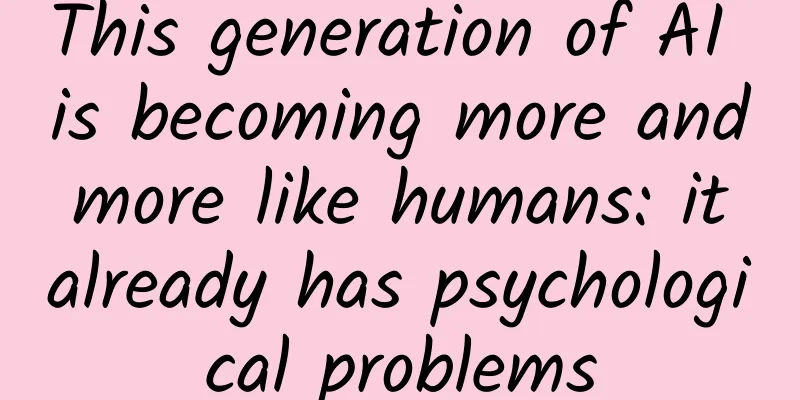This generation of AI is becoming more and more like humans: it already has psychological problems

|
We often say that humans are not machines. We need to eat, drink, defecate, urinate, sleep, and have emotions. Every time I stay up late to review for an exam, there is a voice in my head: "If only I were a robot, I could remember all the knowledge points without sleeping!" However, what may surprise you is that the increasingly advanced artificial intelligence (AI), while evolving towards a more "human" direction, has also learned some of the human faults and started to slack off! This interesting phenomenon was discovered by researchers at the Los Alamos National Laboratory in the United States. The laboratory is developing a neural network that allows it to learn to classify things without reference materials. This neural network simulates how humans learn to distinguish things, just like giving a stack of pictures of animals that a child does not recognize to a child to classify. Although they do not know what an antelope is, they may be able to separate an antelope from animals such as lions and penguins. In this process, researchers found that AI would become unstable after learning for a period of time, and would spontaneously produce images similar to hallucinations. When AI took a short nap, this instability disappeared and it returned to normal working efficiency. This kind of sleep is different from the "sleep state" of ordinary computers. The sleep state of a computer only temporarily "freezes" all activities. To make AI really fall asleep, it is necessary to expose it to noise with a wide range of frequencies and amplitudes. This noise imitates the input signals received by brain neurons when humans are in deep sleep. However, the researchers pointed out that not all AIs need to nap to restore stability. This only happens when training biologically realistic processors or trying to understand biology itself. The neural network in this study is simulating the process of humans and other organisms learning to see and classify things. Most AIs have sufficient computing power due to different systems and can work non-stop like 007. Is boredom also productive? Just slack off with AI What can humans do when they are bored? Probably more than doing business (fog). Boredom is actually an alarm state. When we feel bored, we are dissatisfied with the current situation. It can drive people to escape from this state and find meaningful, novel or exciting things to do. This driving force is neutral and can be good or bad. The bad side may make people slide to the edge of breaking the law for fun, while the good side can also stimulate people's innovation. For example, on a cold and windy night, a camper is sitting in front of a campfire and suddenly hears a noise that cannot be identified. He has two hypotheses: one is that the breeze is blowing the leaves, and the other is that a grizzly bear wants to approach the camp. Should he leave or stay? You need to predict the possible outcome (the leaves are blown by the wind?) and the expected outcome (don't be eaten by a bear), and decide after balancing. If the camper guesses the former and nothing happens, but after a long period of dull boredom, the camper will want to venture into the forest to explore the surrounding area, because the predicted pleasure has been surpassed by the pain of boredom. This is how boredom stimulates exploration and improves autonomy. The same is true for AI, and now some researchers have discovered the role of boredom in AI. Scientists have programmed "boredom" algorithms into AI, allowing AI to find activities that meet its expectations on its own, thereby improving AI's autonomous learning ability. A paper published in Biosystems proposed the importance of "boredom" and explained the mechanism of interaction between boredom and prediction of happiness. How does this mechanism work? During the training process, the "world" provided by the researchers has different levels of complexity. If the machine can accurately predict the "world", it will be happy, but if it continues to succeed, it will become bored and annoyed, and tend to explore new areas. Are you too busy to care about the mental state of AI? Artificial intelligence is the intelligence displayed by man-made machines, which is realized through program coding. When AI moves in the direction of humans, human characteristics may appear. Andreas Elpidorou, a philosophy professor at the University of Louisville, wrote in Scientific American that AI's psychological problems should be taken seriously. He believes that in the future, more intelligent machines will experience boredom and other psychological experiences. Although boredom may inspire creativity, the result may also go in the opposite direction - lack of motivation for autonomous learning, learning what they have learned over and over again, but without any plan to change the current state. These problems will hinder the learning and growth of machines and waste precious resources. If we want to create AI with stronger autonomy in the future, we must pay attention to the impact of AI's psychological state on its behavior. Elpidoru even sensationally proposed that because humans will do all kinds of bad things out of boredom, we will also need to deal with the bad things done by machines in the future - self-abuse or harming others. After all, we don't want to see smart refrigerators cut off the power supply and let food rot because of boredom, or smart cars want to jump into the sea to swim because of boredom. Looking at the more "artificial mental retardation" around us, perhaps paying attention to the psychological condition of AI seems particularly far-fetched. But think about it, the famous three laws of robotics proposed by Isaac Asimov are intended to prevent robots from harming humans. In the face of a world where human-machine interaction is inevitable, it doesn't hurt to think a little further. References [1]https://www.scientificamerican.com/article/what-happens-if-an-ai-gets-bored/ [2]https://www.scientificamerican.com/article/lack-of-sleep-could-be-a-problem-for-ais/ [3]https://www.biorxiv.org/content/10.1101/104521v1.full.pdf [4]https://www.theatlantic.com/magazine/archive/2019/04/robots-human-relationships/583204/ [5]http://ex.chinadaily.com.cn/exchange/partners/82/rss/channel/language/columns/v0m20b/stories/WS5ccf8667a3104842260b9ef5.html [6]https://www.theatlantic.com/magazine/archive/2017/06/make-time-for-boredom/524514/ Author: Yi Yin Editor: Zhu Buchong |
<<: What are the common qualities of these scientific masters?
>>: Body? Consciousness? Which one is the real me?
Recommend
How far away is Betelgeuse, the famously doomed star?
How to measure the distance from Betelgeuse to Ea...
Tea Science | Why is tea bitter? The truth is hidden here →
Have you ever encountered a situation where the t...
After one year online and six months of operation, what did Douyin do to defeat Kuaishou?
First of all, the most important point is: I am a...
What is the difference between pure HTML5 APP and native APP?
[[151272]] I have written some pure H5 apps. Alth...
Waymo partners with car rental giant Avis to provide self-driving cars as a service
According to Reuters, Alphabet's self-driving...
In the bleak global mobile phone market in Q1, who is bucking the trend?
In addition to the Chinese market, in the smartph...
Yueqianli.com's foundation course, where beginners can open up their own money-making channels in seven days
Yueqianli.com foundation course, a beginner can o...
Are dual-camera phones a necessity or just a gimmick?
Smartphone camera technology has reached another ...
Most people don’t know how unhealthy puffed foods are
Puffed food is a new type of food developed in th...
Throwing a baby dolphin to death like a ball! How terrible is it that the killer whale has been focusing on bullying for 60 years?
On July 25, 2022, killer whale researcher Deborah...
How to operate Weibo? Sharing of Weibo operation ideas
Recently, many people have asked me how to operat...
Ibuprofen has become very popular recently. Do you know its origin?
In the fight against the COVID-19 pandemic, ibupr...
Apple releases the latest beta version of iOS 15.2: new child communication safety features added!
[[434241]] Earlier today, Apple released the seco...
Why doesn’t Pinduoduo have a shopping cart?
In October 2019, Pinduoduo's market value sur...









